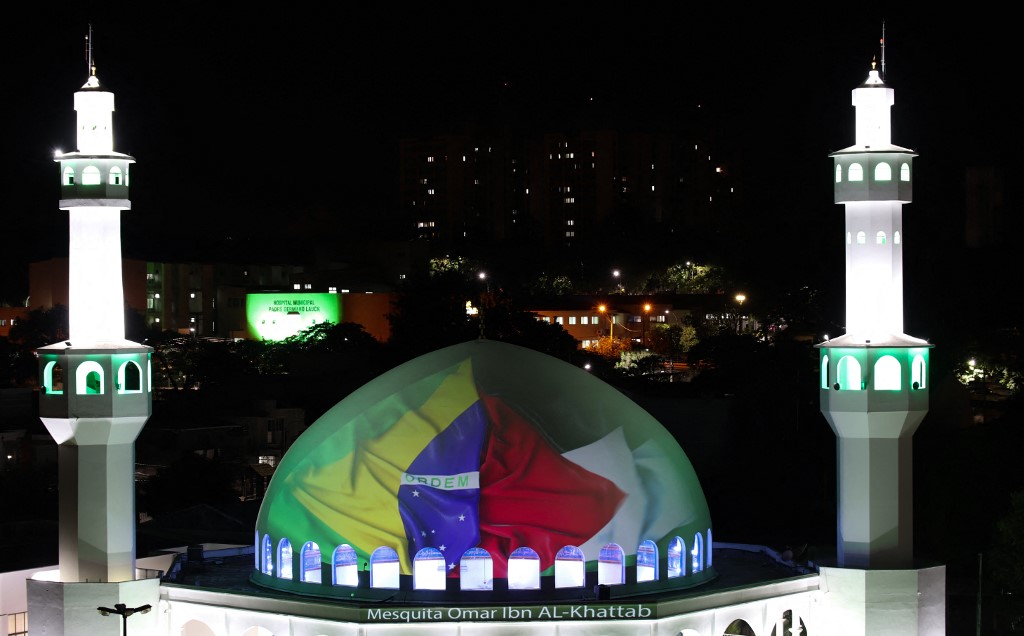SAO PAULO: The city of Foz do Iguacu, a top travel destination in Brazil, welcomed more than 2 million visitors in 2019, most of them drawn to the Iguacu Falls, one of the largest waterfalls in South America.
After a dramatic decline in visits caused by the coronavirus pandemic, the city is preparing to become a halal tourist center and attract Muslims from all over the world.
The idea did not come from nowhere. Part of a tri-border area along with the neighboring cities of Puerto Iguazu in Argentina and Ciudad del Este in Paraguay, Foz do Iguacu has an Arab population of 20,000 — about 7 percent of its 260,000 inhabitants — many of them Muslim. Thousands of Arabs also live on the Paraguayan side.
The Omar ibn Al-Khattab Mosque, a major Islamic place of worship in Latin America, is the most visible sign of Arabs’ historical presence in the region.
Foz do Iguacu has numerous Arab-owned restaurants and shops, and the traditional city tour offered by local travel guides includes an “Arab itinerary.”
Ali Saifi, CEO of Cdial Halal, a halal certification company in Brazil, said: “Those are great advantages for us. There’s already a great halal infrastructure in order to serve the local community. We just need to take those principles to hotels, with the government’s help.”
Saifi was one of the masterminds behind the project, and with an eye on the 1.9 billion Muslims worldwide, the city’s Mayor Chico Brasileiro promptly accepted the idea.
“Our city has one of the world’s natural wonders, which will certainly attract many Muslims,” Brasileiro told Arab News.
“We want to expand their permanency here by making them feeling comfortable with their families.”
Feeling comfortable during international trips to non-Muslim countries can be hard sometimes, said local Sheikh Oussama El-Zahed.
“Food is a major concern when a Muslim travels abroad. Especially when we’re with our families, we get very anxious about it. The idea here is to offer a 100 percent halal travel package,” he added.
After 21 years living in Latin America, Moroccan-born Sheikh Abderrahman Agdaou knows very well the importance of having halal food available while abroad.
“Many people in Latin America just don’t think that there’s pork in several common food items. The same is true of alcohol,” he told Arab News.
Agdaou lived in Chile and Costa Rica before settling in El Salvador in 2005. In these countries, he has always alerted Muslim communities that apparently harmless dishes such as pupusas, the traditional Salvadoran flatbread, may have been cooked in lard, which is made from pork fat. “You have to be alert all the time,” he said.
Agdaou had trouble with such issues several times in Latin America. He recalled once having no food options during a 14-hour-flight from Morocco to Chile in 2000.
“As I always do, I’d previously asked the airline for halal food. I don’t know if they failed to do so out of neglect or prejudice,” he said, adding that the creation of a halal tourist destination in Brazil is something to celebrate.
“I’m glad our Muslim brothers in South America are launching such a relevant initiative. We have a right to be relaxed during our leisure time,” he said.
Cdial Halal will offer training to Foz do Iguacu’s tourism industry employees in halal food and in best practices to welcome Muslims. Hotels will not only have a halal menu, but also special places for Muslim prayers.
Tour agent Patrik Dinis, who offers an “Arab itinerary” to his clients in Foz do Iguacu and Ciudad del Este, told Arab News: “Brazilian tourists are very interested in getting to know the Arab culture in the city (Foz do Iguacu). It’s visible everywhere, from the mosque to Arab schools and women wearing a headscarf on the streets.” Muslims will “feel at home” in Foz do Iguacu, he said.
Felipe Gonzales, president of the city’s Tourism Council, believes that few changes will have to be carried out.
“The most important step is to get the certification and open that market. We want to invite Muslims to be here with their families, and even to celebrate weddings here,” he said.
Brasileiro said he hopes for foreign investment, including from Arab countries, in Foz do Iguacu’s hotel chain.
“We presented our project in Dubai (Expo), and I’m sure investors will come to our city in the near future,” he added.
Full implementation of the project may take a year, Saifi said, “but within six months we’ll certainly have advanced a lot, and the number of Muslim tourists will grow.”




